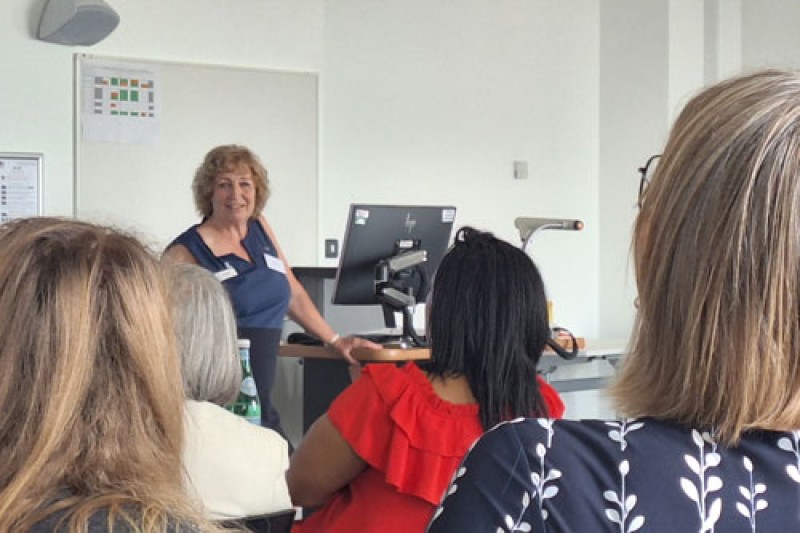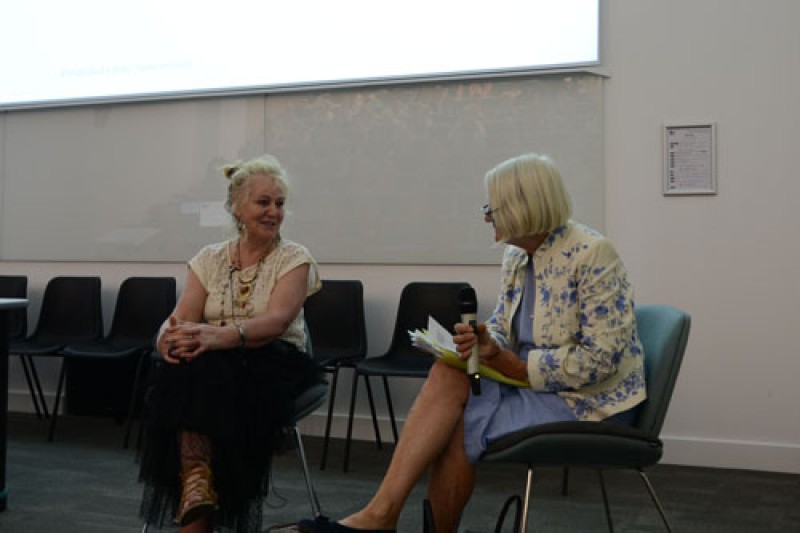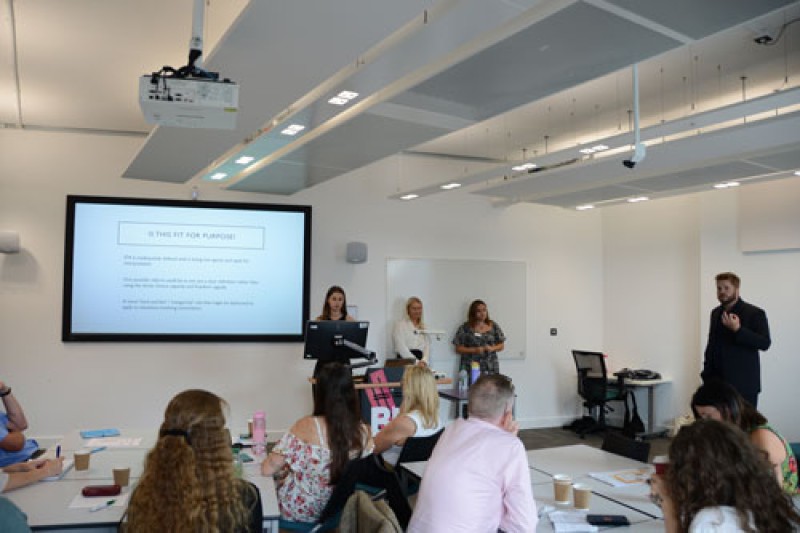 Dr Liz Dominey presented the Soroptimists' report at the conference
Dr Liz Dominey presented the Soroptimists' report at the conferenceUrgent improvements are needed to Special Domestic Abuse Courts if they are to provide the intended protection and support to victims of domestic abuse.
That is the finding of a new report by the Soroptimists UK and Jess Rose, a PhD student at BU, based on observations from over 1000 cases in over 30 magistrates courts around the country.
The report by the was one of the subjects discussed at the Violence Against Women and Girls: Social Justice in Action conference, hosted by the Soroptimists and Bournemouth University on 29th June.
“This latest study supports previous reports which have found that women are not being supported and the special protection that these courts are supposed to provide is not always there,” said Dr Liz Dominey from the Soroptimists Bournemouth Club.
During their observations, the researchers noted that many courts do not have separate doors for the women and their abusers, and they often had to wait in the same room, which can be very intimidating and frightening.
Another common theme found was “gaming”, where a man pleads not guilty and the magistrates rule that there is no case to answer if the victim does not attend the hearing. “Many victims are too frightened to go to court because it is such a daunting prospect. If a woman were to get the necessary support from the moment she reports the case, she is much more likely to be comfortable enough to go through the court process,” says Dr Dominey.
In over 80% of the cases seen by the Soroptimists where the man originally pleaded not guilty, he would change his plea to guilty if his victim did attend.
One of the recommendations of the report is therefore to improve the availability of Independent Domestic Violence Advisers whose job is to support the victim through the court process; it was apparent that IDVAs were not present in many cases observed for the study.
Another issue identified was to ensure women are fully aware of special measures that are available to them, such as video link or screens so they do not have to see the perpetrator in court. These did not appear to be working effectively in many cases.
The need for greater training in domestic violence for magistrates and others in the CJS was also identified. Observers noted inappropriate comments about domestic abuse such ‘why didn’t she just leave him’ during the study.
At the conference, the Soroptimists explained their recommendations detailed in their report to address these systemic flaws.
Despite the serious problems identified, the Soroptimists were encouraged by the responses they received from those working in the system. “We approached the police and people who work in the criminal justice system to explain what we were doing and they were all incredibly supportive. The staff in the courts were very helpful to our observers. Most people realised that the system was failing and needs more funding and resources to improve,” Dr Dominey said.
The conference was organised by the Soroptimist Bournemouth Club and BU’s Centre for Seldom Heard Voices. It brought together a range of professionals, NGOs, charities and interested others to share knowledge, explore limitations and seek solutions to sustain social justice. It was also supported by Tina Symington, Community Safety Manager, Housing & Communities Directorate BCP.
The session opened with a powerful presentation by Sarbjit Athwal, founder of charity True Honour. Sarbjit told her story about getting justice for her sister-in-law who was murdered by abusive members of their family, whilst also living with threats of violence and death from family members herself.
 Paula Harriott (Left) in conversation with Kate Adie CBE
Paula Harriott (Left) in conversation with Kate Adie CBEBU’s Chancellor, Kate Adie CBE, then held a conversation with Paula Harriott, Head of Prisoner Engagement at the Prison Reform Trust. Paula told attendees how she received a prison sentence for drug use whilst she was in an abusive relationship. She also discussed reforms to she would like to see to the prison service to support women who are convicted of non-violent crimes, based on her own lived experience.
Other subjects and researchers discussed on the day included,
- Jamie Fletcher and three of his students, Megan Hall, Abigail Harvey and Callie Thornley-Veal, held a workshop discussing the laws around intoxication and sexual consent and whether they are fit for purpose.
- Dr Kari Davies presented her research looking into how the police can improve the way investigate and disrupt repeat suspects of rape and other sexual offences.
- Dr Louise Oliver and Hannah Gurr held a discussion into acts of violence on parents by children and adolescents and the legislation that covers it.
 Megan, Abigail, Callie and Jamie discussed whether consent laws were fit for purpose
Megan, Abigail, Callie and Jamie discussed whether consent laws were fit for purposeAttendees at the conference were asked for their thoughts on why we are still having to talk about violence against women and girls. These insights will be used in future research from Bournemouth University, led by Dr Orlanda Harvey and Dr Louise Oliver, Senior Lecturers in Social Work at BU, into why systemic problems still exist and what solutions there could be.
Dr Harvey said, “the feedback from the conference was incredibly positive. The Soroptimists and university team are looking to create network of local professionals to work together to continue the collaboration.
“On 25 November, the UN International Day for the Elimination of Violence against Women the 16 Days of Activism campaign aims to raise awareness of gender-based violence begins. Over the course of the subsequent 16 days leading up to 10 December, International Human Rights Day, the United Nations, NGOs and women the world over will be drawing attention to this extreme violation of human rights and the Soroptimists and Community Safety Team are hoping to encourage local organisations to become involved.”



